After working through fundamentals and goals, we spent the month of March looking at: Building Skills.
While that is a bit vague, we know that community managers use a multitude of skills to work through all of the tasks we have on a daily basis, so why not focus on that wide array?
In order to start out exploration in how we all build the skills we need, we held Roundtable Calls, discussions, and conversations throughout the month that revolved around how people determine, build, and grow the skills they need to be successful in community management.
Here's a look at what we found...
March in TheCR Network: Roundtable Calls
Our first call of March focused on engagement skills as we looked at how one member dealt with underwhelming and underperforming communities and reengaged them back to flourishing spaces.
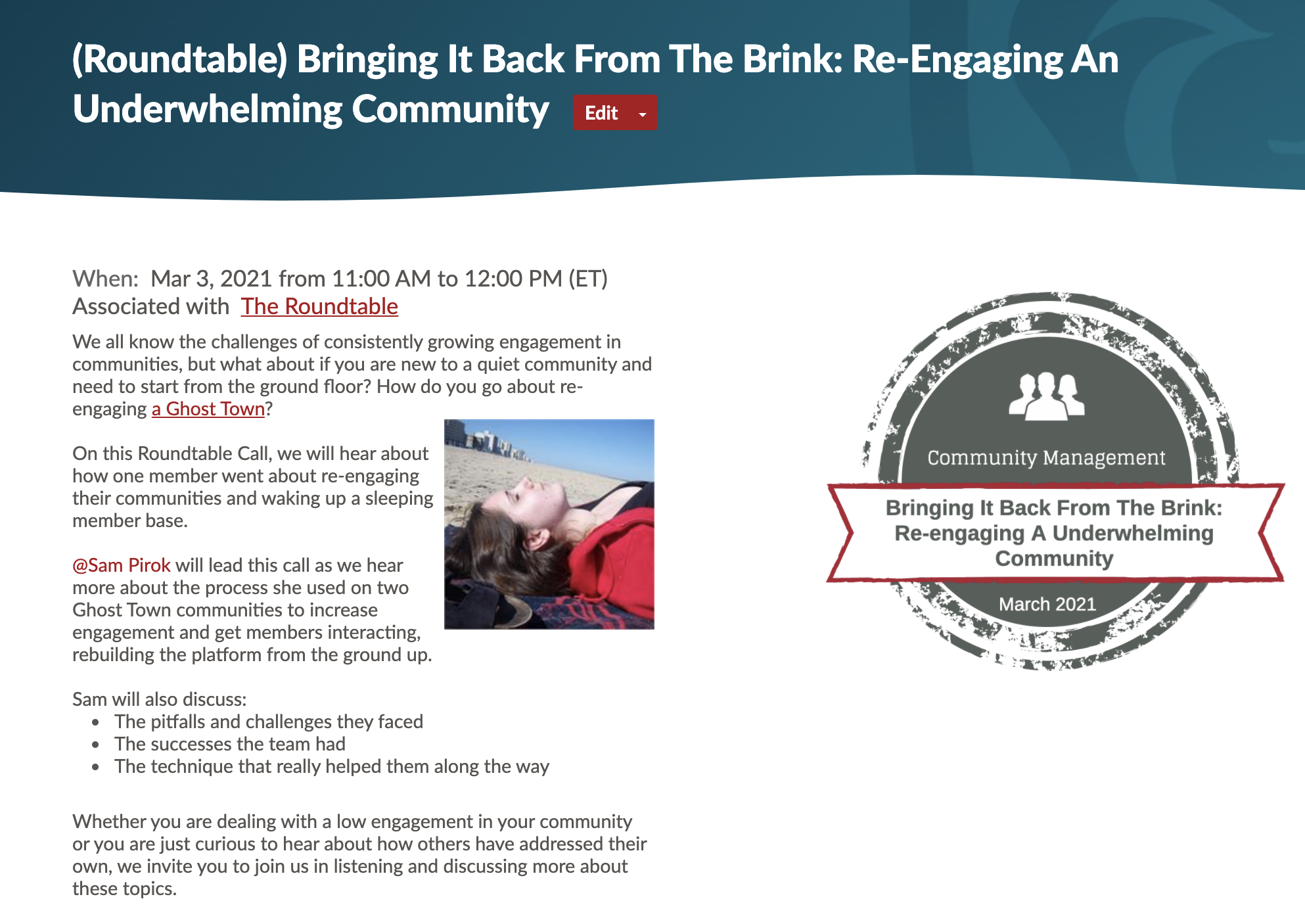
On "Bringing It Back From The Brink: Re-Engaging An Underwhelming Community", led us through her experience with two Ghost Town communities as she talked through how she was able to increase engagement and get members interacting, rebuilding the platform from the ground up.
Sam emphasized the benefits of collaborating with internal and external advocates and leveraging their support to create super users. Building strong relationships is the key to creating these advocates and growing the relationships with those advocates is the key to creating engagement and leaders. Sam focused on the importance of the little things, like sending personal outreach to inactive members and remembering to consistently connect with members as human beings and not just numbers or as a "cover your bases" kind of action, as these are what go a long way with building trust and showing members that you are invested. If you are invested, they will find it easier to also be invested.
So while we may feel confident in our engagement skills, it is always worth a reminder that we cannot forget the little or fundamental things, as they make a world of difference.
If you want to catch up on this call, you can find the Roundtable Recording here.
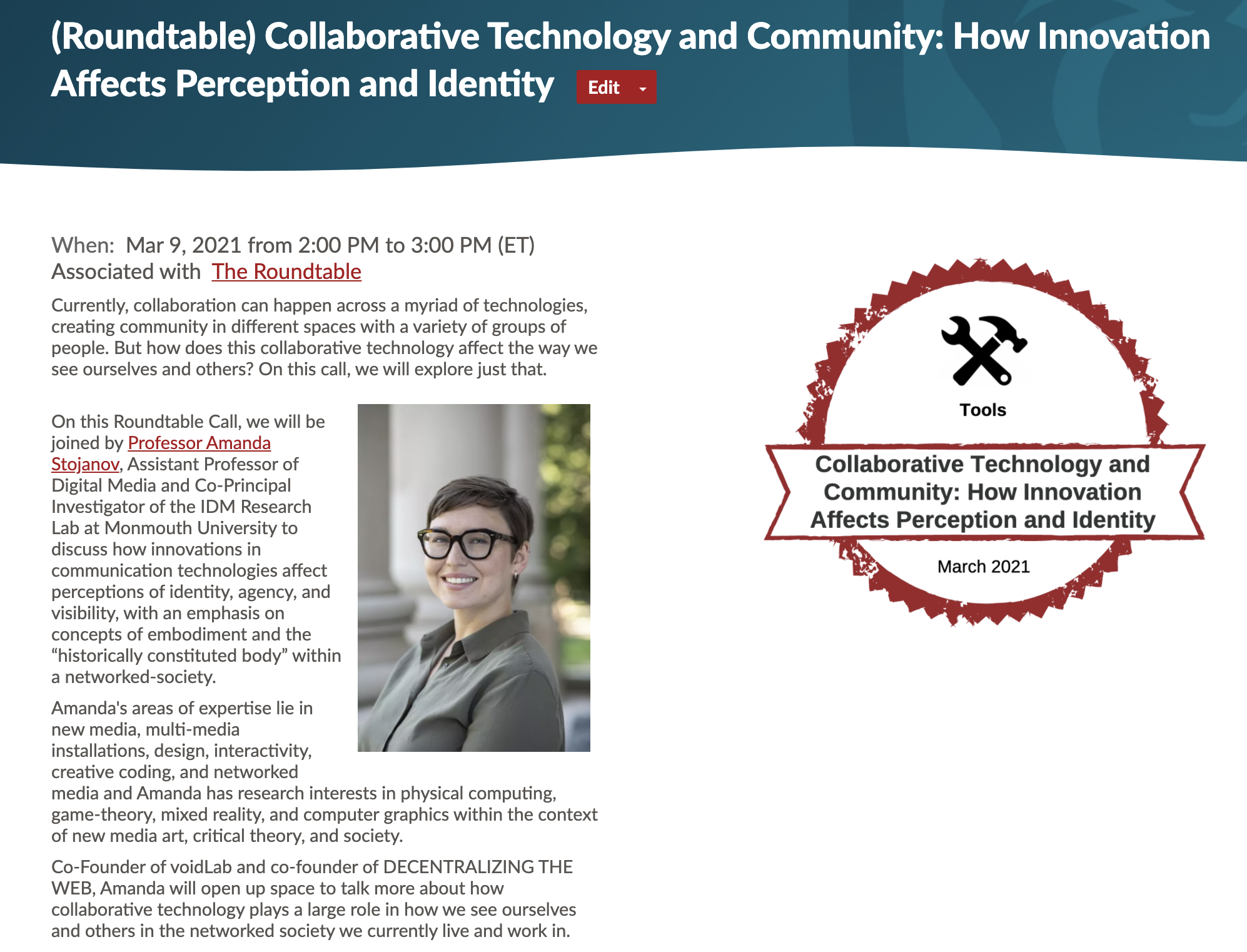
Our next Roundtable Call of March, "Collaborative Technology and Community: How Innovation Affects Perception and Identity", focused on the work and research of Professor Amanda Stojanov, Assistant Professor of Digital Media and Co-Principal Investigator of the IDM Research Lab at Monmouth University. Amanda joined us to discuss how innovations in communication technologies affect perceptions of identity, agency, and visibility, with an emphasis on concepts of embodiment and the “historically constituted body” within a networked-society.
While that can seem a little big to parse out exactly how this all relates to our work in community management, I had several key takeaways on how Amanda's work with technology, collaboration, identity, and community can directly inform our own.
One of those takeaways was how we sometimes need to dig into the specifics and be a little exclusive in order to build stronger ties in communities. On a 2020 Roundtable Call, we heard how one member worked through profiling member segments in order to see who they were not reaching and ultimately found out that it meant they had to prioritize who they were reaching. We cannot be everything to everyone, but we can be a lot to those that need us.
Another takeaway was that we need to make sure that the perspectives we need are in the room when we ask the questions. This may mean simply inviting the right department to a decision-making call or it could mean making sure our member survey reaches each type of member from all areas of the business/world. We also need to meet them where they are. So if we are holding a feedback-related call at a time that is not convenient for people in certain time zones, you are not going to get their perspective. We need to reach out to, gather, and engage different perspectives, especially those that are affected most by the decisions taking place.
These skills can fall into the bucket of engagement and strategic skills, but they are also just good skills to develop as human beings to create a more connected world around us.
If you are interested in listening in to this call, you can find the edited Roundtable Recording here.
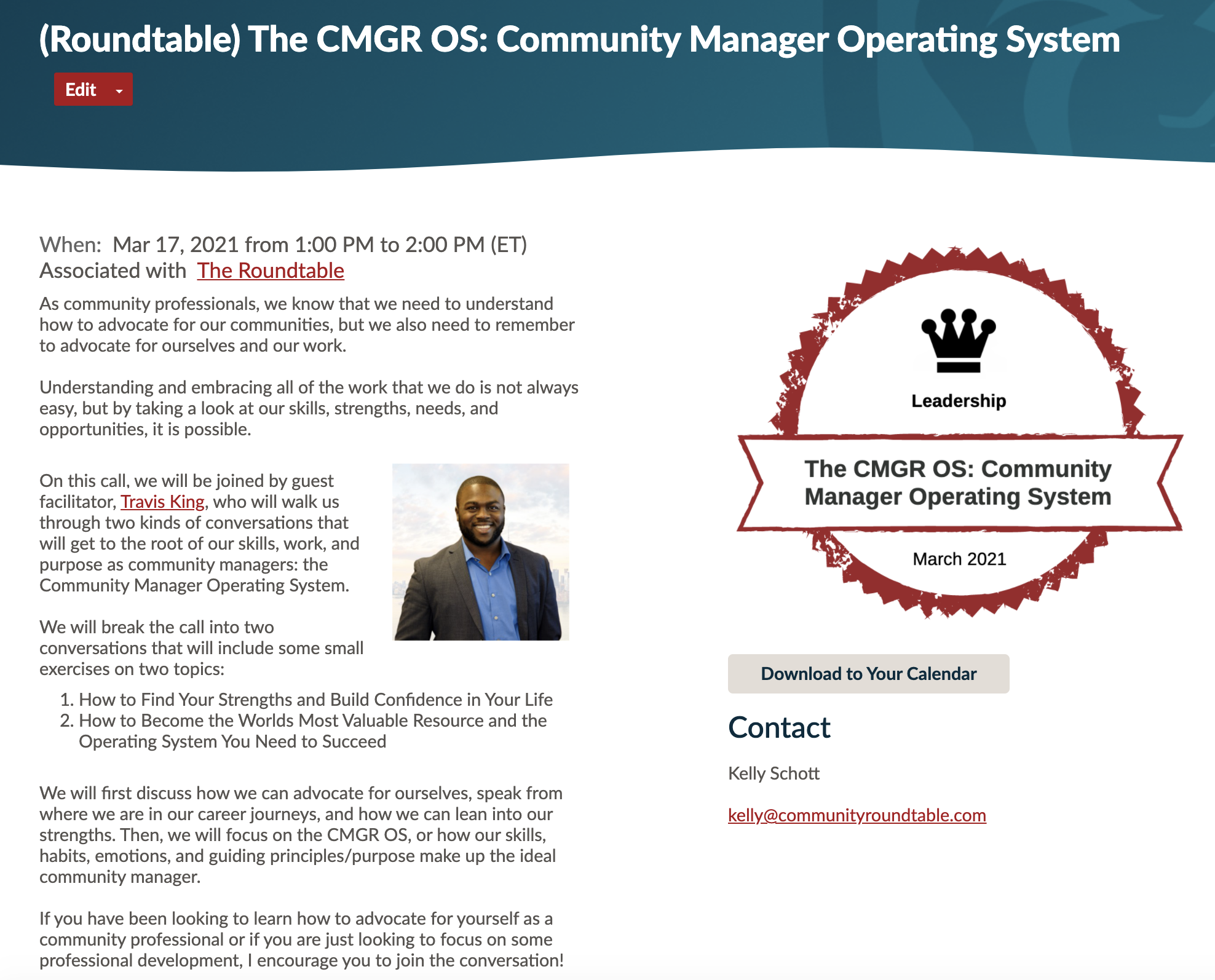
The next call, "The CMGR OS: Community Manager Operating System", was a little more discussion-oriented than our previous calls and looked specifically at the strengths of attendees and how we might translate them into our work to help fight burnout and frustration.
On this call, we were joined by Travis King, who walked us through conversations that will got to the root of our skills, work, and purpose as community managers: the Community Manager Operating System. We spent a bulk of the call really focusing in on one specific topic: How to Find Your Strengths and Build Confidence in Your Life.
Part of the exercise that Travis had attendees complete was to think of three skills and how we use them in our daily lives. This led to the group discussing how we can advocate for ourselves, speak from where we are in our career journeys, and how we can lean into our strengths to alleviate burnout and the stress we feel at work.
While this was not a true "skill builder", it did have us looking more at our strengths and skills and understanding how we can leverage where we are to not only make our lives easier but also see how they fit more into our work. I have always liked framing weaknesses not as weaknesses, but as opportunities, and this call really helped us see the opportunities we have to continue building on our skills, which is especially what we need in a space that is always changing and growing.
If you are interested in listening in to this call, you can find the edited Roundtable Recording here.
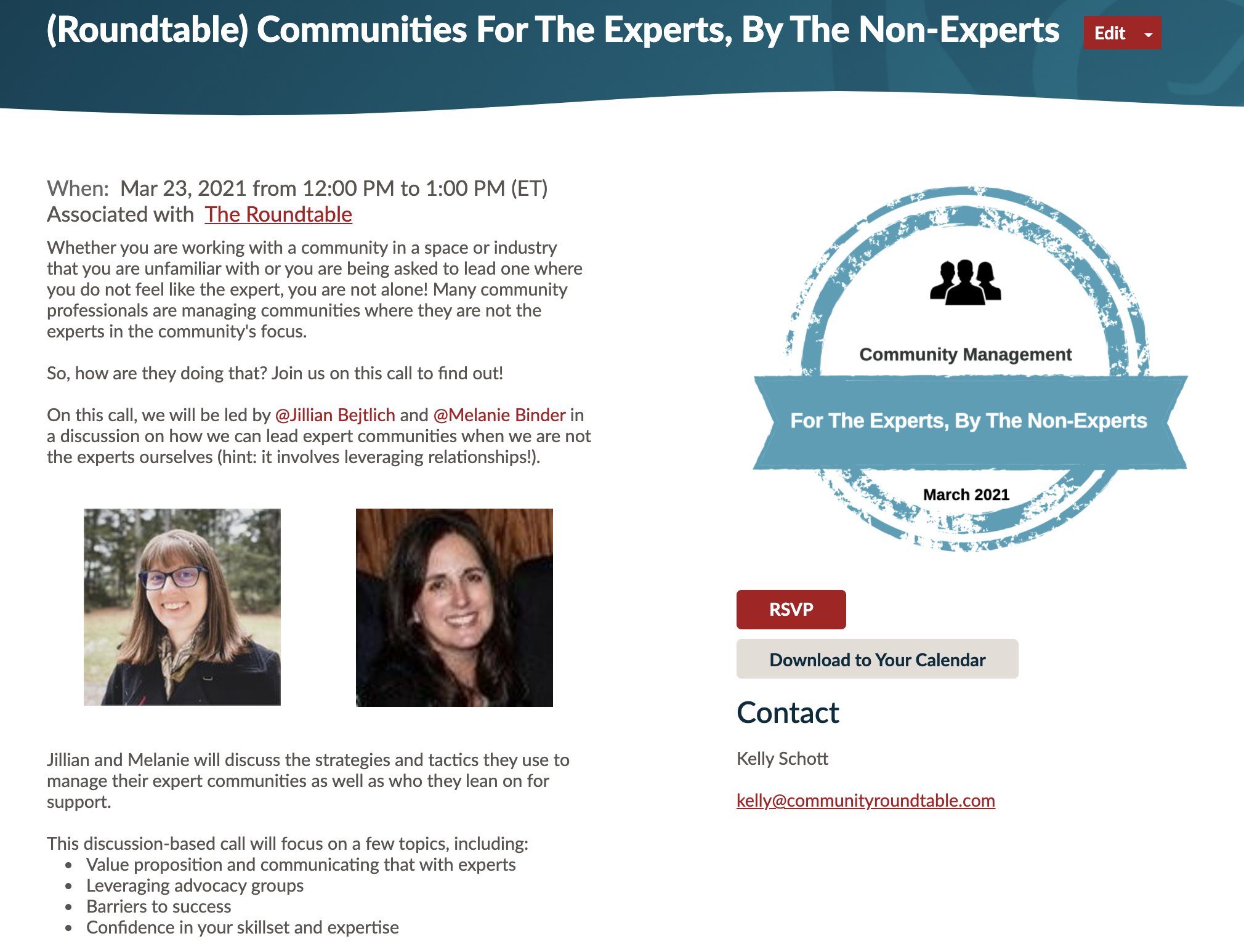
On the Roundtable Call, "Communities For The Experts, By The Non-Experts", two members talked through their experiences managing communities where they were not experts in the subject matter that their members gathered around.
As many of us who work in community know, not being an expert on the topic area of your community is quite common and it is nowhere near impossible navigate, even if it feels that way at times.
On this call, and shared their advice and experiences in how they are able to create resources and provide support while not being the expert in what their members did.
We heard that it is not about you having all of the answers, but knowing about who to bring into the room. Whether it is leveraging the expertise of someone in your organization to provide a resource or tapping another member to help with a question, we have the experts all around us. By leveraging member expertise, we can create super users, who can then create future leaders that will continue to create value in the community.
We also heard that we are, in fact, experts. We are experts in community. So we need to lean on our skills and know that we know how to understand and use community practices to bring value to our members. Whether it is speaking to members to understand their needs or explore the community as a new member would in order to see where you have gaps and can strengthen your engagement strategy, we can use what we know to give as much support to our communities as we would if we were experts in the same subject area.
While this call was not about becoming experts, the skills we identified (confidence in our expertise, leveraging relationships, etc.) are just as valuable and should be looked at as hugely relevant to these situations.
If you want to listen in on this Roundtable Call, you can find the Roundtable Recording here.
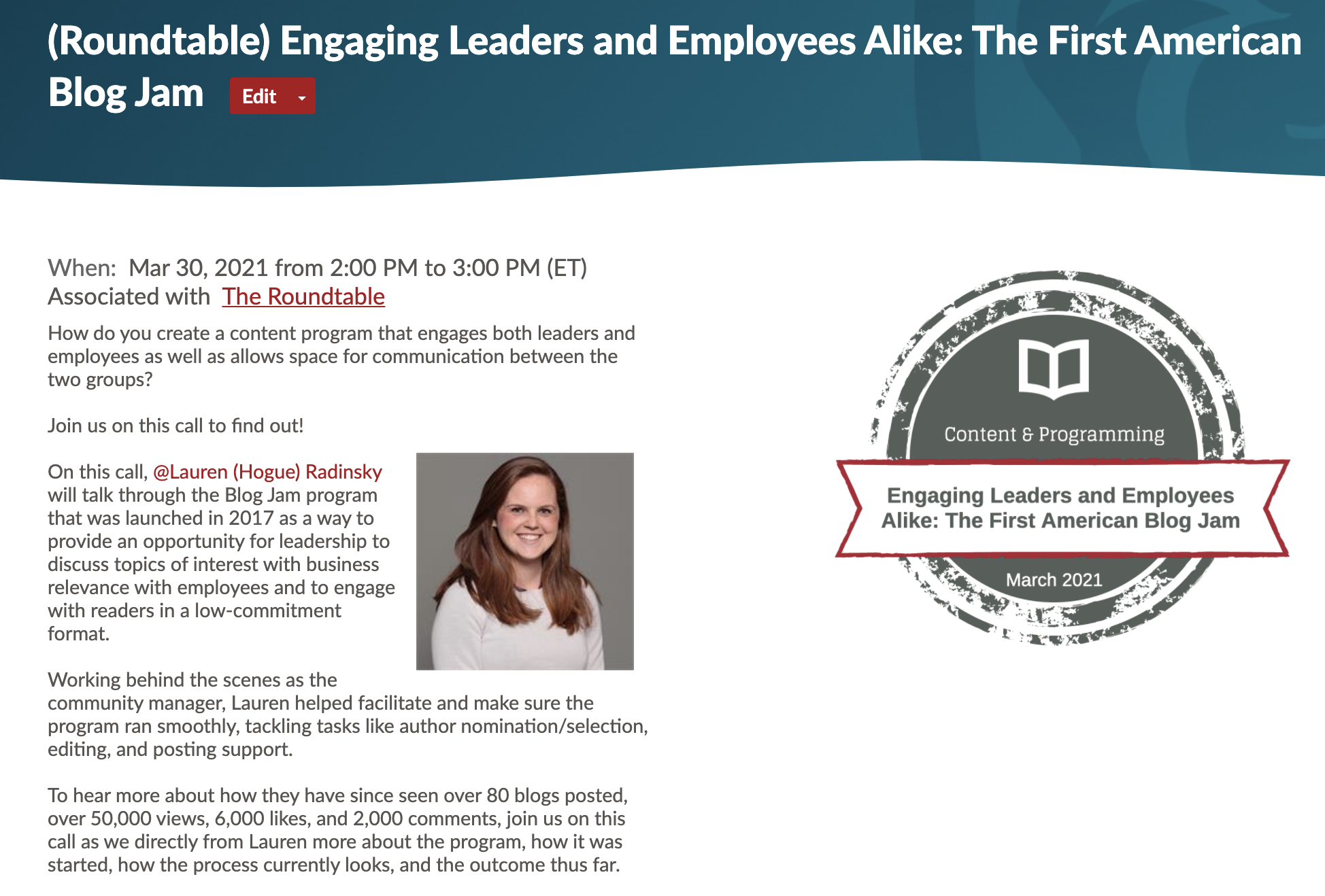
The next Roundtable Call, "Engaging Leaders and Employees Alike: The First American Blog Jam", gave members a look at a successful community program that one member led, specifically to engage leaders and get them connecting with employees in their organization. On this call, shared more about the First American Blog Jam which asked leaders to blog in their internal community to open up spaces to engage with employees.
Lauren and her team did not just leave the work to the leaders though, they did a lot of the prep and outlining work for them, creating templates and examples ahead of time to ensure the success of the blog writer. In building out these templates, Lauren also encouraged ways to engage with the blogs so that both leaders and employees felt like they were being heard and recognized. Instead of having to comment and reply to every comment, Lauren and her team emphasized their company culture that "like equals thanks", so just leaving a like to show that you read and appreciated the comment or work can carry a lot of weight as an action so small.
An impressive case study, the First American Blog Jam is an amazing example of how you can create a program that engages leaders and employees alike while also introducing colleagues to colleagues, remembering that we are all people. With one key takeaway being to "know your audience", Lauren and her team worked to make sure that Blog Jam was universal and could introduce employees to new leaders, highlighting people from across the organization. Lauren mentioned that Blog Jam became something that was not just a "community thing", but a way to communicate with the entire organization through shared ownership.
While this is not directly about building personal skills, there is something we can learn or a technique we all can take from this case study and bring to our own communities. It may be that you need to templatize some emails, but it could also be an idea of a new program to engage leaders in your organization. But regardless of what that takeaway is, we got a look at an immensely valuable way to get leaders engaged in a community and connecting with employees.
If you want to listen in on this Roundtable Call, you can find the Roundtable Recording here.
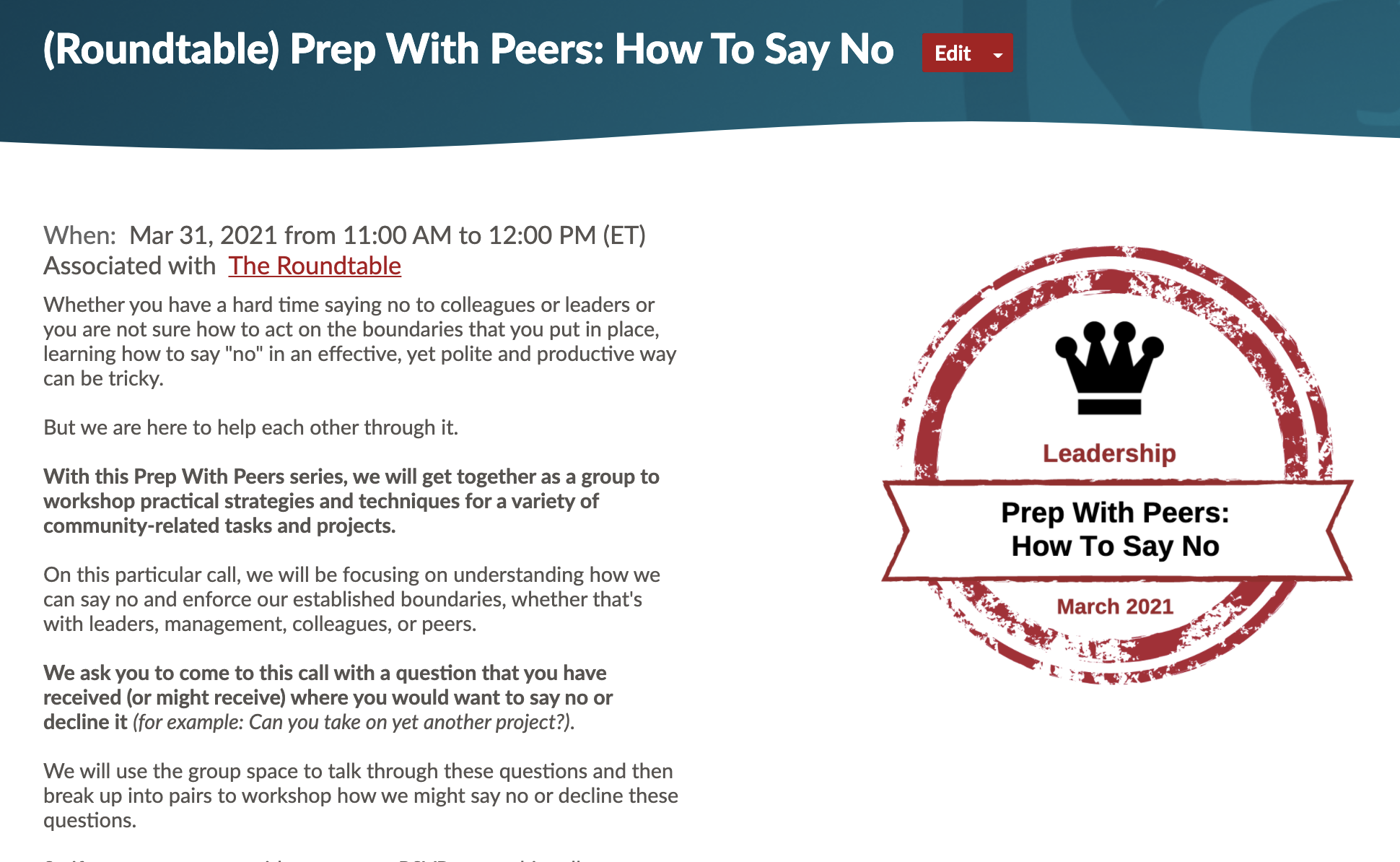
The call, "Prep With Peers: How To Say No", acted a bit differently than a "traditional" Roundtable Call in that it functioned more as a peer workshop: bringing members together to practice literally saying "no" to requests. On the call, we focused specifically on understanding how we can say no and enforce our established boundaries, whether that's with leaders, management, colleagues, or peers, when we need to do so.
We used the group space to talk through frequent questions and requests and then workshopped how we might decline them in a polite, responsible, and forgiving way.
While this call functioned more as a working session and was more about us exploring how we can navigate unfavorable or undesirable situations, it was a skill builder all the same. We worked on our confidence, our boundaries, and our interpersonal skills in order to get us to a place where we feel certain enough to be able to say "no" to make sure we and others are successful. It is not an easy task, but we can (and did) build skills to make it easier.
We heard some great examples and had some great discussions this month, so why not round it out with what we learned about members of TheCR Network overall...
What Did You Think?
For the month of March, we opened up a poll to take a look at what skill areas TheCR Network members felt strongest in. While we will be taking our ideas for how to build on our skills forward into the rest of the year, we also need to recognize where we are already quite strong, lean into those areas, and collaborate with others who are strong where we are not.
So, what skillsets do TheCR Network members feel strongest in? Let's find out...
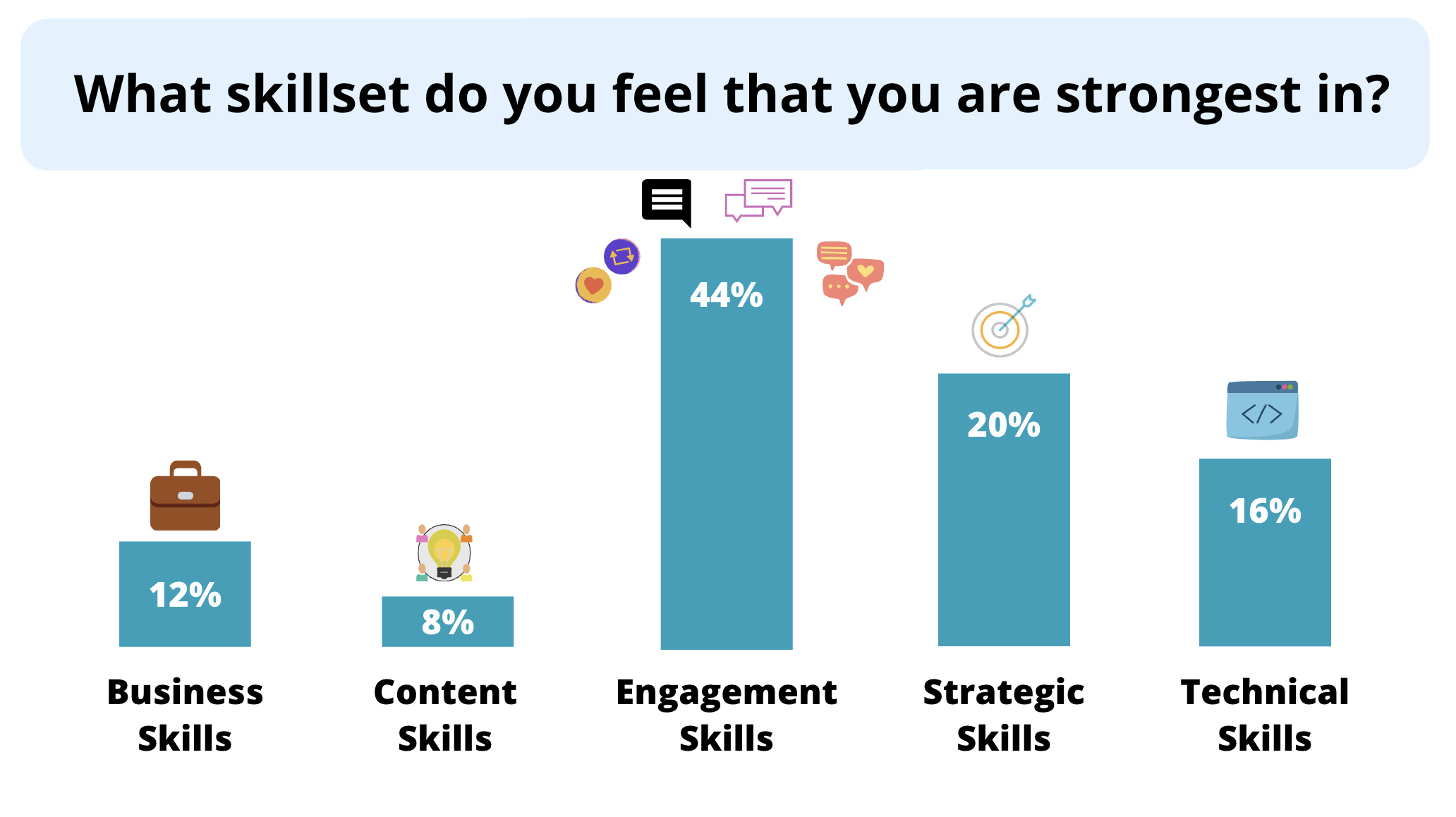
The poll results come from a sample size of 25 respondents and show that members feel that they are strongest in engagement skills by far (gaining 44% of the vote), with strategic skills pulling into second at 20%. Interestingly, this almost mirrors the percentages seen in the State of Community Management 2018 report (chart on pg. 28) in regards to the prioritization of skillsets (with 42% ranking engagement and 23% ranking strategy as top priority).
While we have to spend much of our time working around engagement, it is optimistic to see the percentages of strategic and business skills adding up to about one third of respondents' strongest skillsets as these are the areas where we had seen the biggest gaps in the research and also the areas where we could use the most help in order to advocate for our programs.
We may all have different strengths (and we should!), but no matter what area you feel the strongest in, it is great to know there are others in our networks who have strengths opposite to ours that we can continue learning from. Through building relationships, supporting each other, and just listening to new perspectives, there is so much we can learn from others in this space.
And speaking of building relationships and learning from others, let's look ahead to next month...
So, Where Do We Go From Here?
As we continue building on our learning from the first quarter of 2021, we are looking forward to taking this work in goals and skills into our relationships with others in our organizations, communities, and peer networks. Since we know where we stand, what we are aiming for, and how we might be able to get there, what do we do next? We find the people who can help us, who we can help, and who would be great partners!
So for the month of April in TheCR Network, we are looking forward to focusing on the fundamentals of Identifying Key Relationships. This will include relationships not only with our members, but with leadership, colleagues, peers, and anyone else who is integral to our community and career success.
So, if any of these conversations or concepts have sparked an idea or recommendation from you, let us know! While we plan our programming calendar, we also leave space for reactive programming, spur-of-the-moment topics, and member involvement, so leave us a note or send us a message and we'll get something together to address your topics of interest.
And if you're not a member of TheCR Network, or if you know someone who isn't a member of TheCR Network, but would love to participate in these conversations, please reach out! We're happy to talk about how you or they can get involved.
If you'd rather do that yourself, you can find out more about how to join TheCR Network here.